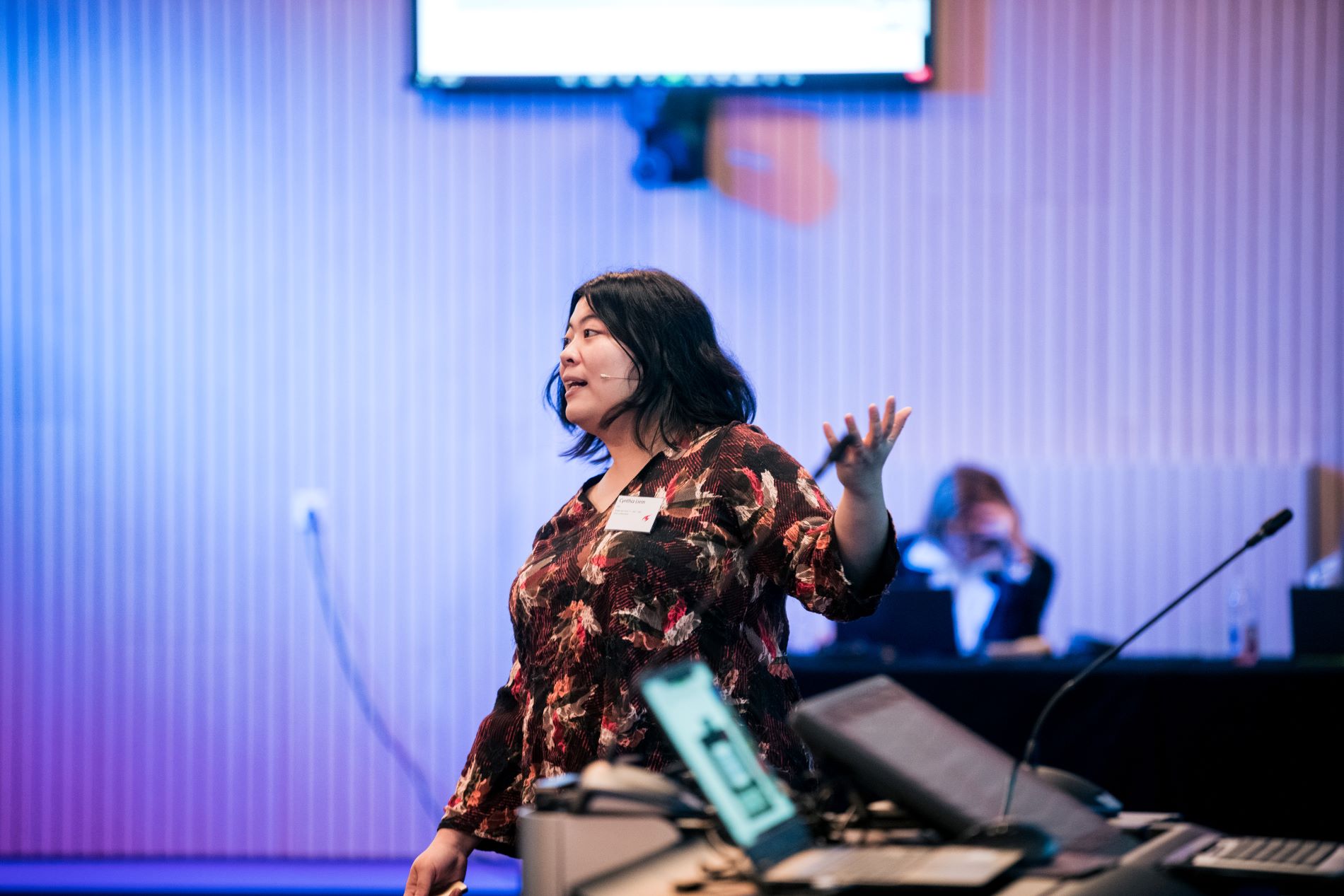About 85 people from TU Delft attended a hybrid symposium on knowledge security at TU Delft on Tuesday. Scientist Cynthia Liem spoke about a trial in which she is involved.
Informaticus Cynthia Liem was één van de sprekers op het symposium. (Foto: Hugo Onink/ Lifeshots Photography)
The term knowledge security is heard more and more frequently in the corridors, labs and meeting rooms of Dutch universities. On Tuesday 13 December, scientists and staff members of TU Delft caught up on this issue at a symposium on knowledge security. The main language of the gathering was Dutch. An English language version of the symposium will be held in 2023, most likely in May.
The gathering is an interim follow-up to the China symposium that has been held three times. As Policy Advisor Peter Gill said at the opening of the symposium, “China is more than knowledge security and knowledge security is more than China”.
What is knowledge security?
Knowledge security is defined differently in every country, an investigation by the Leiden Asia Centre showed recently. In the Netherlands, the objective of knowledge security is to prevent sensitive technology, information of strategic importance, and knowledge that can be used to oppress certain population groups from ending up in risky countries. Preventing the surreptitious exertion of influence also falls under knowledge security.
As examples of countries that have their eyes on foreign universities, the Dutch intelligence services regularly name Russia, China and Iran. That the risks are real was revealed by Delta in a series of investigative articles about TU Delft-China partnerships on technologies that are interesting for the People’s Liberation Army. And in October of this year, an investigation by the broadcaster NOS, TV current affairs programme Nieuwsuur, and the Belgian newspaper De Tijd, showed that Russian spies had access to Dutch high tech companies and a knowledge institution.
‘Knowledge security affects us all’
“Knowledge security affects all of us at TU Delft,” said Programme Director of Knowledge Security Peter Weijland. At present, TU Delft is involved in six joint projects that will run up to and including 2023 whose objective is to improve knowledge security. “After that, knowledge security at TU Delft will be more highly organised, even though we do not yet know what the solution will then be.”
The projects are based on the National Knowledge security guidelines that the Dutch Government presented in January this year.
- 1. Protection of academic values
- 2. Legal frameworks
- 3. Potential threats and risk analysis
- 4. International partnering
- 5 Risk management
- 6 Cyber security
For the third joint project – potential threats and risk analysis – TU Delft did a risk analysis in the area of key technologies: technologies that the Dutch Government views as of economic and geopolitical importance. This includes nano technology, photonics, quantum technology and artificial intelligence. “Our analysis shows that about 40% of TU Delft scientific publications are about key technologies,” says Weijland. “Some people were shocked at that figure as it means that we are highly vulnerable. But at the same time, it means that we are doing what a technology university is supposed to do: develop important technology.”
Biggest treasure
The fourth joint project is about the ‘partnering tools’, a country neutral version of the China tools designed by Gill. The partnering tools consist of a series of short guidelines intended to help researchers think about whether or not to enter into a partnership with a peer, institute or research lab. Joint project six – cyber security – includes the protection of research data. Weijland says that “Our greatest treasure lies hidden in research data. You do not want it to end up on the street so it is important to think about who has access to it and under what conditions.”
Computer Scientist Cynthia Liem took part in a TU Delft thinktank on knowledge security last year as part of the ‘moral debate’ pilot. The members of the thinktank pored over various cases last year: partnership proposals about which the dean or researchers involved had doubts and where more information is needed for the potential risks on the unintended transfer of knowledge. Liem says “A partnership may sometimes be legal as the partner is, for example, not on a sanctions list, but you can still ask yourself if it is desirable.”
‘We dedicated a lot of time to each case’
The people involved in the pilot will present their findings to the Executive Board in 2023. Liem has already made her personal findings public. “We dedicated a lot of time to each case, more time than we ever took for discussions. To my mind this is badly needed in these types of issues,” says Liem. According to Liem, knowledge security is often thought of as vague and complicated, and has meant that the moral aspect of whether to enter a scientific partnership has not been given enough consideration. “But it is absolutely not vague. As we went into depth, we could clearly identfy the values that we support and could thus use them to take a decision.”
Trump and China
Professor Marijk van der Wende of Utrecht University talked about the changed thinking around international scientific collaboration. “Just take all the anti-China rhetoric from the White House under Trump. You now see this in other countries too.”



Comments are closed.